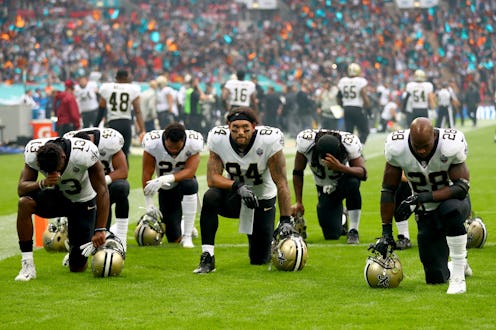News
The NFL Is Backing This New Criminal Justice Reform Bill — Is It Enough?

From #TakeAKnee to Trump, the NFL has had a hard time figuring out how to make their players & the president happy. Just this week, the worlds of football and politics collided again, when the National Football League (NFL) weighed in on a Senate bill. In a letter to the four senators behind the Sentencing Reform and Corrections Act of 2017, the NFL voiced its support for criminal justice reform efforts. "Over the last two seasons, one particular issue that has come to the forefront for our players and our teams is the issue of justice for all," the letter read. "Ultimately, we all share a responsibility to find a path towards unity, one that goes well beyond sports."
The bill was sponsored by Sens. Charles Grassley, Richard Durbin, Mike Lee, and Sheldon Whitehouse. Lee's office tells Bustle that he welcomes the NFL's support, and adds, "I hope their endorsement can lead to some real dialogue."
The bill addresses a number of problems in the criminal-justice system that many see as contributing to over-incarceration. The bill would reduce mandatory-minimum sentencing requirements for non-violent drug offenses, and this provision could be retroactively applied by judges in cases involving prisoners currently serving longer minimum sentences for similar crimes. It also invokes a bipartisan commission to examine drug sentencing laws at every level of the judicial system — federal, state, and local. That's a crucial provision, given that most prisoners serving drug-related sentences were convicted at the state level, not in a federal court.
The letter from the NFL, signed by both commissioner Roger Goodell and the Seattle Seahawks' Doug Baldwin, Jr., states that "football and community are the twin pillars of the NFL." It explains that when communities are hurting, the teams hurt too. And then there's this: "Over the last two seasons, one particular issue that has come to the forefront for our players and teams is the issue of justice for all."
The letter further nods at the protests from the players when it asserts that the "Sentencing and Reform Corrections Act would address many of the issues on which our players have worked to raise awareness of over the last two seasons."
This is the second recently publicized letter written by the NFL. After months of controversy, Goodell sent one just days ago to all 32 NFL teams, expressing it was his stated desire that players stand — not kneel — during the national anthem. And that first letter contains some hints as to the reason behind the NFL's decision to throw its support behind a Senate bill aimed at reforming some elements of the criminal justice system.
After explaining his view of the importance of honoring the national anthem, Goodell wrote to the NFL teams:
We also care deeply about our players and respect their opinions and concerns about critical social issues. The controversy over the Anthem is a barrier to having honest conversations and making real progress on the underlying issues. We need to move past this controversy, and we want to do that together with our players.
Many criminal-justice reform advocates will likely laud the bill for addressing one of the most controversial judicial mandates in modern history — significantly harsher punishment for possession of crack over powder cocaine. That distinction has long been seen by many as racially motivated, and the Sentencing Reform and Corrections Act will lower the disparity for future sentencing, as well as allow for retroactively reduced sentences.
President Trump has waged a weeks-long attack on NFL players for "disrespecting the flag" by protesting on the field. But players have openly clarified they are protesting police brutality and racism, not the military personnel symbolized by the flag. While the NFL said it would not force players to stand during the national anthem, Goodell's comments encouraging them to indicated, to many people, whose side he was taking.
The NFL's move to publicly support criminal justice reform in its Monday letter appears to be in line with its effort to recognize the players' "opinions and concerns about critical social issues," but whether or not that support translates to the controversy over the protests remains unclear.